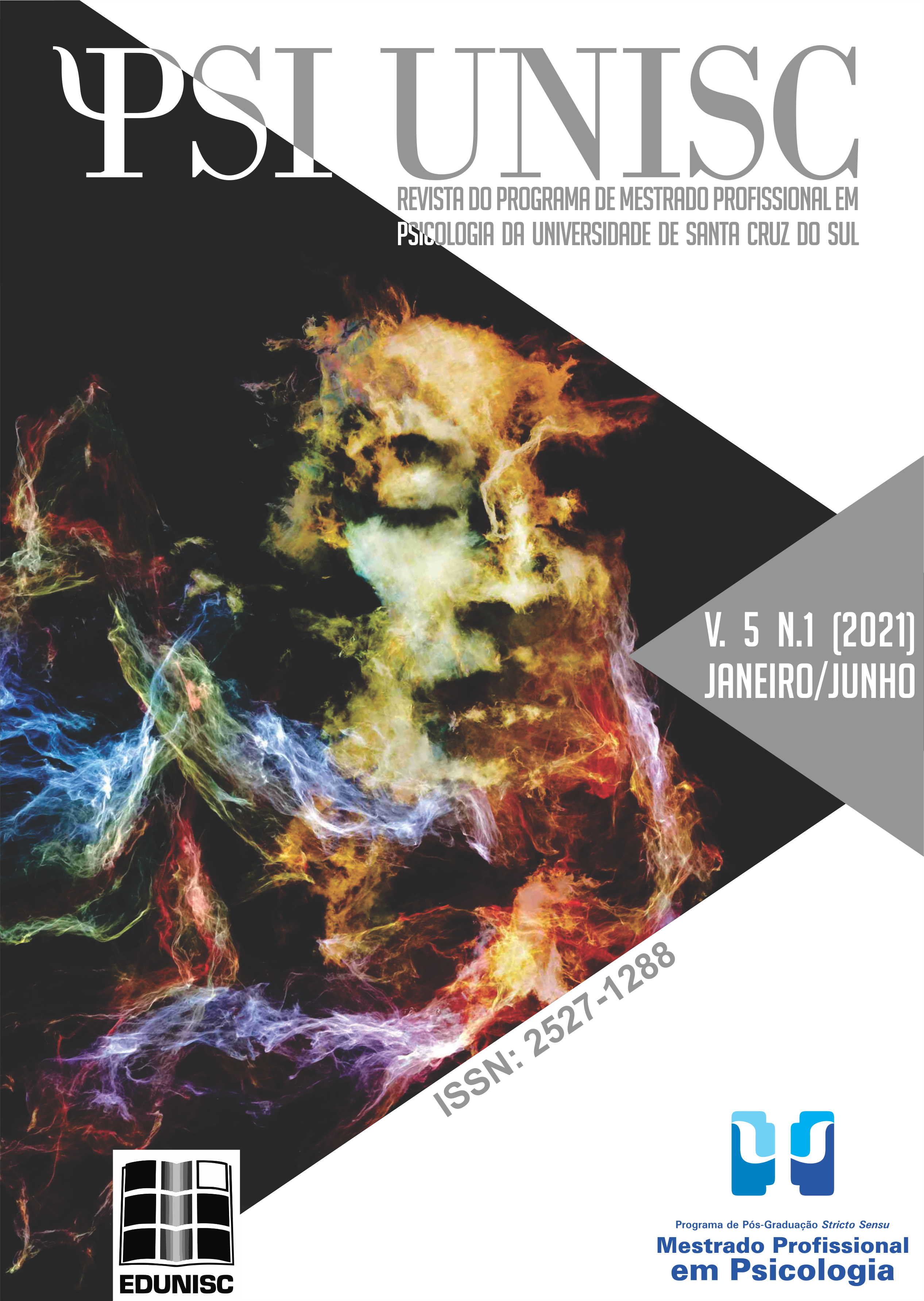Personalidade e cognição: um estudo em idosas brasileiras
DOI:
https://doi.org/10.17058/psiunisc.v5i1.14728Palavras-chave:
Avaliação psicológica, Envelhecimento, Saúde.Resumo
O objetivo foi analisar os efeitos de diferentes intervenções cognitivas em dois grupos de idosas, além de identificar os traços de personalidade e suas relações com a cognição. Participaram 14 idosas com idade média de 64,79 (DP =± 3,57), com ensino médio completo ou superior. Essas idosas eram pertencentes a um grupo de intervenções cognitivas e físicas e foram avaliadas em dois momentos (pré-intervenção e pós-intervenção), individualmente por meio de uma anamnese, medidas cognitivas (exame cognitivo de Addenbrooke – versão revisada) e de personalidade (Bateria Fatorial de Personalidade). Após a primeira avaliação, as participantes foram divididas em grupos de estimulação e treino cognitivo, e posteriormente, para a análise dos resultados, optou-se por reagrupar as participantes em duas categorias, sendo as que mantiveram/melhoraram ou pioraram nos resultados. Os resultados indicaram que escores baixos dos traços de personalidade de instabilidade, extroversão e interações sociais apresentaram ser significativos com as participantes que mantiveram ou melhoraram no momento pós-intervenção. Identificou-se a possibilidade de se incluir as diferenças individuais na construção e condução de práticas que envolvam intervenções cognitivas, visando uma maior eficácia das técnicas utilizadas na área da saúde.Downloads
Referências
Basak, C., & O'Connell, M. A. (2016). To Switch or Not to Switch: Role of Cognitive Control in Working Memory Training in Older Adults. Front Psychol, 7, 230. doi: 10.3389/fpsyg.2016.00230
Belleville, S., Hudon, C., Bier, N., Brodeur, C., Gilbert, B., Grenier, S., ... Gauthier, S. (2018). MEMO+: Efficacy, Durability and Effect of Cognitive Training and Psychosocial Intervention in Individuals with Mild Cognitive Impairment. J Am Geriatr Soc, 66(4), 655-663. doi: 10.1111/jgs.15192
Birman, J. (2015). Terceira idade, subjetivação e biopolítica. História, Ciências, Saúde, 22(4), 1267-1282. doi: 10.1590/S0104-59702015000400007
Boujut, A., & Belleville, S. (2019). Où en est-on avec les programmes d’interventions cognitives pour les personnes âgées?. Revue de neuropsychologie, 11(1), 60-69. Recuperado de https://www.cairn.info/revue-revue-de-neuropsychologie-2019-1-page-60.htm
Brehmer, Y., Kalpouzos, G., Wenger, E., & Lövdén, M. (2014). Plasticity of brain and cognition in older adults. Psychol Res, 78(6), 790-802. doi: 10.1007/s00426-014-0587-z
Butler, M., McCreedy, E., Nelson, V. A., Desai, P., Ratner, E., Fink, Kane, R. L. (2018). Does cognitive training prevent cognitive decline? A systematic review. Annals of Internal Medicine, 168, 63-68. doi: 10.7326/M17-1531
Carvalho, C. A., & Caramelli, P. (2007). Brazilian adaptation of the Addenbrooke’s Cognitive Examination-Revised. Dement. Neuropsychol, 1(2), 212-216. doi: 10.1590/s1980-57642008dn10200015
Ceviker, A., Ozlu, K., Deryahanoglu, G., Demirdoken, C., & Turkay, H. (2020). The examination of the personality traits and optimal performance mood of the university athletes. Pedagogy of Physical Culture and Sports, 24(1), 4-11. doi: 10.15561/18189172.2020.0101
Chariglione, I. P. F., & Janczura, G. M. (2013) Contribuições de um treino cognitivo para a memória de idosos institucionalizados. Psico-USF, 18(1), 13-22. doi: 10.1590/S1413-82712013000100003
Chariglione, I. P. F. S., Janczura, G. A., & Belleville, S. (2018). Cognitive interventions to improve memory in healthy older adults: the use of Canadian (MEMO) and Brazilian (Stimullus) approaches. Estudos de Psicologia (Natal), 23(1), 2-13. doi: 10.22491/1678-4669.20180002
Craik, F. I. and Bialystok, E. (2006). Cognition through the lifespan: mechanisms of change. Trends in Cognitive Sciences, 10, 131–138. doi: 10.1016/j.tics.2006.01.007
Curtis, R. G., Windsor, T. D., & Soubelet, A. (2015). The relationship between Big-5 personality traits and cognitive ability in older adults - a review. Neuropsychol Dev Cogn B Aging Neuropsychol Cogn, 22(1), 42-71. doi: 10.1080/13825585.2014.888392
Dima, D., Friston, K. J., Stephan, K. E., & Frangou, S. (2015). Neuroticism and conscientiousness respectively constrain and facilitate short-term plasticity within the working memory neural network. Hum Brain Mapp, 36(10), 4158-4163. doi: 10.1002/hbm.22906
Gehlen, M., Ventura, J., Stobäus, C., Bauer, M., & Vacaro, J. (2020). Historical dialectical materialism in the learning of the elderly person in the promotion of health care. Research, Society and Development, 9(2), e156922214. doi: 10.33448/rsd-v9i2.2214
Griffin, A. S., Guillette, L. M., & Healy, S. D. (2015). Cognition and personality: an analysis of an emerging field. Trends Ecol Evol, 30(4), 207-214. doi: 10.1016/j.tree.2015.01.012
Hill, N. L., Kolanowski, A. M., Fick, D., Chinchilli, V. M., & Jablonski, R. A. (2014). Personality as a moderator of cognitive stimulation in older adults at high risk for cognitive decline. Res Gerontol Nurs, 7(4), 159-170. doi: 10.3928/19404921-20140311-01
Hock, R. S., Lee, H. B., Bienvenu, O. J., Nestadt, G., Samuels, J. F., Parisi, J. M., Jr, P. T. C., & Spira, A. P. (2014). Personality and cognitive decline in the Baltimore Epidemiologic Catchment Area follow-up study. Am J Geriatr Psychiatry, 22(9), 917-925. doi: 10.1016/j.jagp.2012.12.217
Hyer, L., Scott, C., Atkinson, M. M., Mullen, C. M., Lee, A., Johnson, A., & Mckenzie, L. C. (2016). Cognitive Training Program to Improve Working Memory in Older Adults with MCI. Clin Gerontol, 39(5), 410-427. doi: 10.1080/07317115.2015.1120257
Laros, J. A., Peres, Al. J. S., Andrade, J. M., & Passos, M. F. D. (2018). Validity evidence of two short scales measuring the Big Five personality factors. Psicologia: Reflexão e Crítica, 31(32). doi: 10.1186/s41155-018-0111-2
LeMonda, B. C., Mahoney, J. R., Verghese, J., & Holtzer, R. (2015). The Association between High Neuroticism-Low Extraversion and Dual-Task Performance during Walking While Talking in Non-demented Older Adults. J Int Neuropsychol Soc, 21(7), 519-530. doi: 10.1017/S1355617715000570
Li, B., Zhu, X., Hou, J., Chen, T., Wang, P., & Li, J. (2016). Combined Cognitive Training vs. Memory Strategy Training in Healthy Older Adults. Front Psychol, 7, 834. doi: 10.3389/fpsyg.2016.00834
Luchetti, M., Terracciano, A., Stephan, Y., & Sutin, A. R. (2016). Personality and Cognitive Decline in Older Adults: Data From a Longitudinal Sample and Meta-Analysis. J Gerontol B Psychol Sci Soc Sci, 71(4), 591-601. doi: 10.1093/geronb/gbu184
Margioti, E., Kosmidis, M. H., Yannakoulia, M., Dardiotis, E., Hadjigeorgiou, G., Sakka, P., ... Scarmeas, N. (2020). Exploring the association between subjective cognitive decline and frailty: the Hellenic Longitudinal Investigation of Aging and Diet Study (HELIAD). Aging & Mental Health, 24(1), 137-147. doi: 10.1080/13607863.2018.1525604
Marissa A. G., Courtland S. H., Kharine R. J., Violeta J. R., Talia L. R. & Lloyd S. M. (2020). A Multi-method Investigation of the Personality Correlates of Functional Ability in Older Adults. Clinical Gerontologist, 43(4), 363-364, doi: 10.1080/07317115.2019.1709239
Maseda, A., Millán-Calenti, J. C., Lorenzo-López, L., & Núñez-Naveira, L. (2013). Efficacy of a computerized cognitive training application for older adults with and without memory impairments. Aging Clin Exp Res, 25(4), 411-419. doi: 10.1007/s40520-013-0070-5
Mowszowski, L., Batchelor, J., & Naismith, S. L. (2010). Early intervention for cognitive decline: can cognitive training be used as a selective prevention technique?. Int Psychogeriatr, 22(4), 537-548. doi: 10.1017/S1041610209991748
Nocera, J. R., Mammino, K., Kommula, Y., Wharton, W., Crosson, B., & McGregor, K. M. (2020). Effects of Combined Aerobic Exercise and Cognitive Training on Verbal Fluency in Older Adults. Gerontology and Geriatric Medicine,6, 1-11-. doi: 10.1177/2333721419896884
Nunes, C. H. S., Hutz, C. S., & Nunes, M. (Eds.). (2016). Bateria Fatorial de Personalidade (BFP): Manual Técnico. São Paulo: Casa do Psicólogo.
Pervin, L. A., & John, O. P. (Eds.). (2003). Personalidade: Teoria e Pesquisa. Brasil: ArtMed.
Pothier, K., Gagnon, C., Fraser, S. A., Lussier, M., Desjardins-Crépeau, L., Berryman, N., ... Bherer, L. (2017). A comparison of the impact of physical exercise, cognitive training and combined intervention on spontaneous walking speed in older adults. Aging Clin Exp Res., 30, 921-925. doi: 10.1007/s40520-017-0878-5
Rahe, J., Petrelli, A., Kaesberg, S., Fink, G. R., Kessler, J., & Kalbe, E. (2015). Effects of cognitive training with additional physical activity compared to pure cognitive training in healthy older adults. Clin Interv Aging, 10, 297-310. doi: 10.2147/CIA.S74071
Rebok, G. W., Ball, K., Guey, L. T., Jones, R. N., Kim, H. Y., King, J. W., ... Willis, S. L. (2014). Ten-year effects of the advanced cognitive training for independent and vital elderly cognitive training trial on cognition and everyday functioning in older adults. J Am Geriatr Soc, 62(1), 16-24. doi: 10.1111/jgs.12607
Sacramento, A. M., & Chariglione, I. P. F. S. (2019). Intervenções físicas e cognitivas combinadas para melhora cognitiva no envelhecimento: Uma revisão sistemática. Revista Brasileira de Psicologia do Esporte, 9(1), 47-63. doi: 10.31501/rbpe.v9i1.9965
Snitz, B. E., Weissfeld, L. A., Cohen, A. D., Lopez, O. L., Nebes, R. D., Aizenstein, H. J., ... Klunk, W. E. (2015). Subjective Cognitive Complaints, Personality and Brain Amyloid-beta in Cognitively Normal Older Adults. Am J Geriatr Psychiatry, 23(9), 985-993. doi: 10.1016/j.jagp.2015.01.008
Stephan, Y., Boiché, J., Canada, B., & Terracciano, A. (2014). Association of personality with physical, social, and mental activities across the lifespan: Findings from US and French samples. Br J Psychol, 105(4), 564-580. doi: 10.1111/bjop.12056
Tran, U. S., Wasserbauer, J., & Voracek, M. (2020). Testing the incremental validity of dispositional mindfulness over and above the Big Five in accounting for mental health: A facet-level structural-equation modeling and predictor communality and dominance approach. Personality and Individual Differences, 156, 109769. doi: 10.1016/j.paid.2019.109769
Zhu, X., Yin, S., Lang, M., He, R., & Li, J. (2016). The more the better? A meta-analysis on effects of combined cognitive and physical intervention on cognition in healthy older adults. Ageing Res Rev, 31, 67-79. doi: 10.1016/j.arr.2016.07.003
Downloads
Publicado
Como Citar
Edição
Seção
Licença
A submissão de originais para este periódico implica na transferência, pelos autores, dos direitos de publicação impressa e digital. Os direitos autorais para os artigos publicados são do autor, com direitos do periódico sobre a primeira publicação. Os autores somente poderão utilizar os mesmos resultados em outras publicações indicando claramente este periódico como o meio da publicação original. Em virtude de sermos um periódico de acesso aberto, permite-se o uso gratuito dos artigos em aplicações educacionais e científicas desde que citada a fonte conforme a licença CC-BY da Creative Commons.




